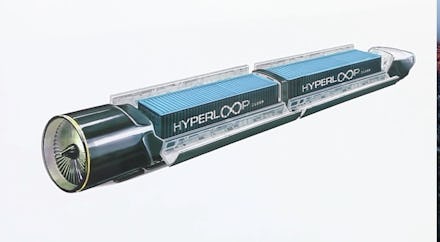When the Hyperloop Finally Launches It Probably Won't Be in the US

Right now Hyperloop Technologies is building a test track for its ultra-fast transportation system in Nevada, but the first Hyperloop may not be launching in the U.S.
"The regulatory environment in the U.S. isn't friendly," Hyperloop Technologies vice president Knut Sauer told Mic. "That's why I believe the first Hyperloop will not be in the U.S." Already the company has looked at a route between Finland and Sweden as well as areas within Russia. There's also been interest from countries in the Middle and Far East, Sauer said.
Hyperloop Technologies isn't the only game in town. There's a possibility Hyperloop Transportation Technologies, a crowd-sourced effort to create the the futuristic transportation system, could decide to launch in the U.S. first. The company is already building a test track in California's Quay Valley. But it seems this company is also exploring a European launch. On March 10, the company revealed an agreement with the Slovakian government to build a line connecting cities in Austria and Hungary.
There has been vocal support in the U.S. for the Hyperloop technology from organizations like SpaceX, which is currently hosting a Hyperloop pod-development competition, and from the U.S. Secretary of Transportation, who attended the design weekend portion of SpaceX's contest. However, the regulatory environment paints a different picture.
"There's a lot of interest, but no one can override the democratic system you have in the U.S.," Sauer told Mic. "We cannot afford having a five-year back-and-forth process."
Just look to California's bullet-train initiative, which has experienced a series of delays, for evidence of the snail's pace with which the U.S. welcomes innovative technologies like the Hyperloop.
The bullet train is a transportation enterprise aimed at ferrying riders between Los Angeles and San Francisco in less than three hours, NBC Bay Area reported. Funding for the project was first approved eight years ago, and officials have spent years trying to acquire the necessary land. The endeavor broke ground in January 2015, but as of February, it had only obtained 63% of the 29 miles needed in California's Central Valley, according to the Associated Press.
The bullet train is expected to cost $68 billion. An open lawsuit contends the undertaking violates terms of a $9 billion bond helping to fund the railway that voters agreed to in 2008, according to the Los Angeles Times. Specifically, the bond described the Bullet Train as being able to deliver passengers from Los Angeles to San Fransisco in two hours and forty minutes. Lawyer Stuart Flashman argued that project officials won't be able to execute on that promise because they've agreed to keep the trains running at speeds of 125 miles per hour, which is not fast enough to get passengers from one city to another in under three hours. Additionally, the bond act required that all money related to the project be pinpointed ahead of construction. The California bullet train has faced more than 12 separate lawsuits over the course of its life.
While there is a certain excitement over the Hyperloop, it is bound to face similar hurdles in acquiring land. Companies building this technology will also have to work with regulators to approve safety standards so that a Hyperloop line can operate legally within the U.S.
"I reflexively felt that this proposal was impractical because it faced some seemingly insurmountable barriers," Transportation Secretary Alex Foxx told participants at SpaceX's Hyperloop Pod Design Competition in College Station, Texas. "But, skepticism is the enemy of progress. And government must stop automatically saying "no" to innovative new ideas, choosing instead to give fair consideration to these proposals that have the potential to make life better for Americans."
Though Foxx supports the idea of the Hyperloop, Sauer is still focusing initial rollout efforts on other parts of the world.
"Right now we're trying to boil it down to the five most promising projects," Sauer told Mic. He wasn't specific about when the Hyperloop will roll out to the general public, but Sauer said he expects to make major strides by the end of 2016. "We're pretty certain that once we have our Kittyhawk moment by the end of the year, then it will [take] big steps forward."